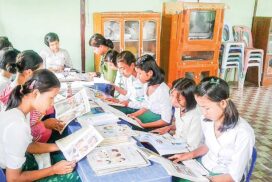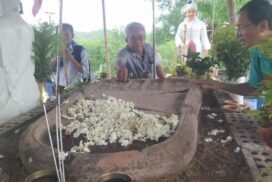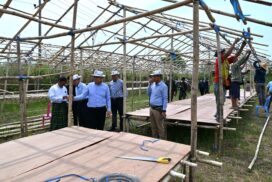I have heard some people say that time cannot be managed by anybody, and this is right to some extent in my view because time is passing slowly and steadily, second after second, without stopping. In other words, a thing called time may be considered not even our own. After all, what they want to mean is that the passage of time must not be controlled by any means, as the proverb says `Time and tide waits for no man´, but the time which has not yet flown by should be well planned for the future. Although the past is past, the future is now. Time, i.e., age, is only a limited potential resource of human survival chance, so good care ought to be taken to develop time management skills in the present. Those who will have to do so include outstanding students, professional teachers, young couples, and self-made businessmen. Trying to manage time might seem like a silly sense of humour sometimes; however, it is really found effective and efficient in down-to-earth situations. Alongside careful considerations of drawing a systematic study schedule, this article is intended for all students from every educational field. Here is how.
Looking at the potentially allowed length of an academic year and private time is the very first consideration for a study timetable. This is each of the solutions to the following questions: How much time will be formally allocated to an academic year? Four months a semester, eight months a year? How much is the total study time for a course? Five or seven or twelve years? To my certain knowledge, the two fields, namely medicine and law, are internationally of the longest study periods. And how many hours are spent in a day’s school? How about a self-study time? Though `Never too old to learn´, as Myanmar saying goes, it is best if a student endeavours to do his best for education while he is young, simply for his ability to memorize apparently lessen as long as he is not getting any younger.
Knowing a classroom timetable by heart becomes the second consideration in making a timetable for study. Classroom timetables tend to show how many hours have been set in each period of teaching or lecturing, for example, 40 minutes or 45 minutes or 50 minutes, how many periods there are in the timetables, how long the break time is, what start time and end time of a school’s day are, how long the total school time is, and which subjects or studies are instructed. When a student sees his classroom timetable properly, he will be able to spend his own much-better time than normal. A great deal of concentration on study is the most important in the classroom and this concentration should help many students less work in their exercises after class. On the whole, the highest potential interval for an average concentration in class is said to last 15 minutes or so. However long that interval takes, absolute concentration on studies during class time is of the essence. In addition, the homework that is given one day but may not be corrected by teachers just another day can be conditionally postponed by students to a later but not-too-long date if they are dab hands with timetables.
Being able to know the subject nature inside out turns out to be the third consideration for planning a study schedule of great importance. It will, in the main, be found that there are two kinds of subjects-art subjects and science subjects. Since language is indispensable for learning art subjects, learners must be fluent language users. It can be even seen that some art learners are weak in subject-related languages sometimes. They had better spare time for language study and practice besides subject time, especially if the language is not their mother tongue. Not only that, art subjects also require extra-curricular reading, excursions, sightseeing tours, and group discussions, which usually take time, apart from classroom study. And linguistic excellence is often needed while science subjects are being studied. Not having language accuracy in science subjects may lead to any misunderstanding about scientific information. More importantly, subjects of science entail laboratory experiments that are likely to cause lengthy delays. All in all, both kinds of subjects normally keep students, especially undergraduates or postgraduates, taking long in their studies for term papers, dissertations, and further research.
When beginning to make a study schedule, the difficulty of subjects or studies should be thought of at the very first. Frankly enough, most students are observed to start studying the subject that interests them quite a lot, or that they like most. This is just a big mistake in their study routines. Of course, the subjects at which they are actually bad ought to be at the top of their study list, being arranged in order of difficulty as much as necessary. After that, students need to think about whether they have put adequate time into each subject or study. It will be better if they like to take their subject lessons back within 24 hours after teaching the lessons is finished at school, or otherwise, having school lessons again merely after such these 24 hours would undermine their ability to have understood those lessons bit by bit. Also, students have to sit at the study table around 15 minutes in advance with their physical readiness, physiological readiness, and emotional readiness for study. Last but not least, self-study time must be totally free from playtime, rest time, bath time, food time, relaxation time, sleep time, and so forth, even though the short length, few study periods and poor sequence of subjects are in the timetable. Any private time of study should by no means be affected by those times. Furthermore, study timetables can be fixed with any regularity, depending upon the periods when a student would be perfectly willing to carry out their own study.
As mentioned above, there must be sufficient time taken for every subject or study in a schedule. But some unexpected flaws like not getting enough time for any subject or study can happen even with a well-prepared schedule. If so, ample or extra time should have been added to that schedule, especially by moderating the time in which nothing is done or reducing the time that is given to a subject more than average. Alternatively, students must be able to adjust their timetables still being used in such a way that the subjects which they strengthen thanks to the timetables have been left below in the study list, and then, the subjects in which they are still weak are put first in the list.
As said earlier, time is constantly going by without being controlled. Hence, organizing the coming time is certainly a sort of taking quite a great risk as well. It is generally accepted that a time schedule is an essential component of successful study. On the other hand, keeping a study timetable is of its own strengths and weaknesses. As regards the strengths, a timetable arouses students’ intrinsic motivation for studying as well as providing them with a systematic approach to study effectiveness and efficiency. Moreover, schedule drawers can guess pretty easily what will happen next on the route to study, or they will never get lost on the road to education. As for the weaknesses, the students who cannot run their own study schedules very well would possibly be under their control, for instance, studying in sheer self-limited time. Re-drawing a study timetable several times is not likewise a good habit. Following the timetable to the letter for the duration of the first few weeks, students do not have to postpone or waste the time approximately calculated in that timetable for any reason. The weaknesses of a study schedule notwithstanding, the so-called `time management´ should have been done beforehand by each and every individual student. Time is priceless, mainly the present.
Time Management of Drawing a Systematic Study Schedule
- July 24, 2023
- 714














